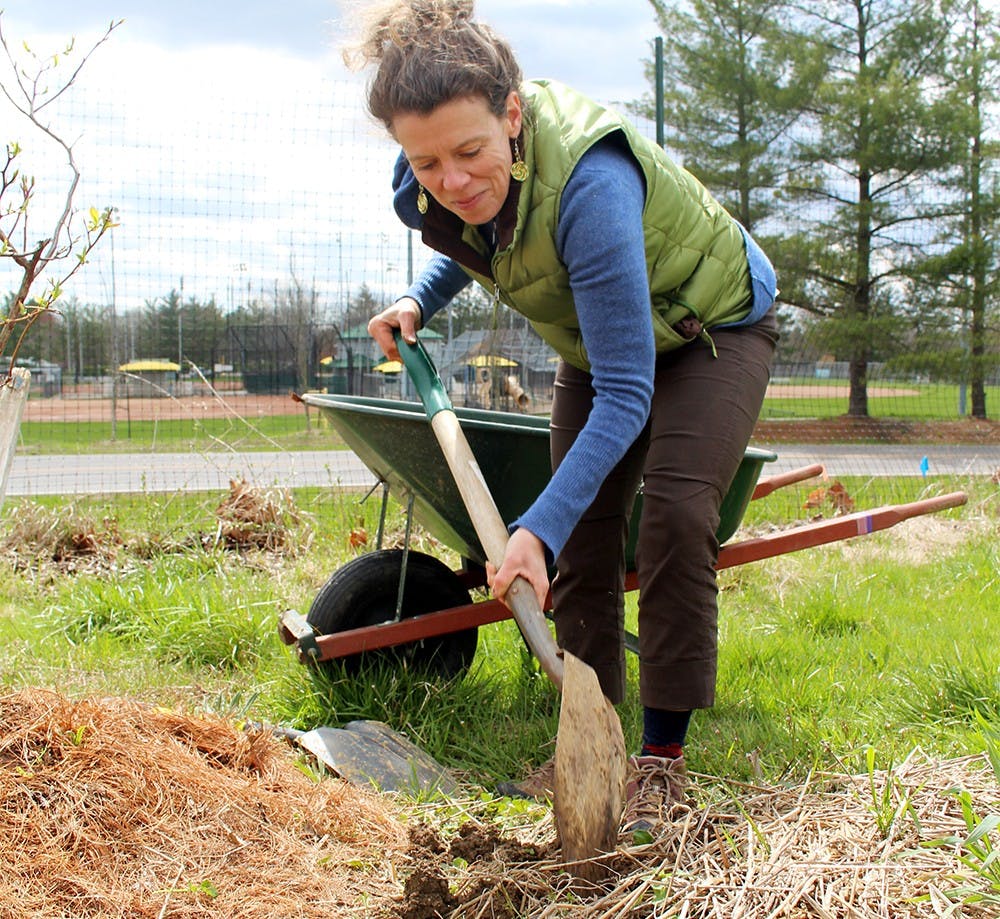Amy Roche led a group of new volunteers through the Bloomington Community Orchard on April 2.
The Saturday Work and Learn Day group took a break from weeding to tour the trees, raised beds and arbors in the fenced area off South Highland Avenue.
“There is quite a diversity of plantings — it’s not like you would normally find around here, like an apple orchard with just a handful of cultivars,” she told the group. “We have plums, pears, apples, cherries, grapes, blueberries, currants, goji berry ... .”
Roche, an original board member at the BCO, stepped down as chair in January.
Now the leader of the Outreach team, she remains active in the orchard’s education and planting projects, which have ramped up as the weather warms.
“One of the beautiful things about the orchard is that I think it has been this lovely model of civic engagement,” Roche said. “It’s low-barrier access to leadership.”
As Outreach leader, Roche now helps other communities with a focus on sustainable food or gardening with their own projects by teaching them the lessons she and the orchard have learned in the last six years.
Aileen Driscoll first volunteered with BCO in the summer of 2014.
As the community partner plantings manager, she works on the Outreach team with Roche to give away young trees and organize planting operations.
“Amy is very supportive and passionate about her work with BCO,” Driscoll wrote in an email. “She is very dedicated, and I think she inspires those around her to be creative and do their best work, in whatever capacity that may be.”
In early 2010, Roche bought a house with a small yard, where she planned to try edible landscaping — the integration of food-producing plants into a lawn or aesthetic arrangement.
“I’m deeply enchanted by the potential for sort of sovereignty over our own lives by growing our own food,” she said.
More importantly, she said she wanted to grow fruit trees, as her father had fostered a love of fresh, ripe produce in her at a young age.
“He used to tell me, ‘a good piece of fruit sends juice running down your arm,’” she said.
Amy Countryman, the eventual founder of the BCO, had completed her undergraduate program in environmental science at the School of Public and Environmental Affairs at IU in late 2009.
Though Roche knew Countryman as a farmers market vendor and a friend of a friend, the two were not closely acquainted, she said.
Countryman’s undergraduate thesis proposed planting edible trees in Bloomington — a proposal that received a grant from the city to begin an orchard.
“They said, ‘we have a plot of land and seed money, so we want you guys to do this,’” Roche said. “And Amy said, ‘there isn’t a ‘you guys,’ it’s just me and this idea.’”
Roche attended the first planning meeting Feb. 22, 2010, with about 100 other interested planters in the City Council Chambers.
Feb. 22 is Roche’s birthday.
“I like to say it’s the best birthday party I’ve ever gotten,” she said.
Nowadays, the orchard has about 50 core volunteers, as well as interns and people who occasionally help with the Saturday Work and Learn Days or other planting projects, Roche said.
At its outset, though, Roche said the orchard’s leadership was uncertain.
“We were really sort of an organically, innocently naive, upstart nonprofit,” she said.
After searching for outside help running the orchard, Roche said she and other interested citizens looked around the table where they were planning and realized the leaders they wanted were already there.
“People who came on after that would ask us how to do things,” Roche said. “As though we knew, after a year, how to totally manage an orchard.”
Roche’s experience shows in her immersion in group planting projects, from leading impromptu tours to teaching interns and volunteers the best way to remove a weed’s entire root system.
“Good soil is going to make good plants,” she said. “Having crappy soil and then adding nitrogen ... and chemicals is like eating junk food, then taking a lot of prescription medicines. Like treating symptoms. Instead, we’re building ourselves up a stable, healthy crop.”
A previous version of this story misstated the orchard's location. It is off South Highland Avenue, not South High Street. The IDS regrets this error.






